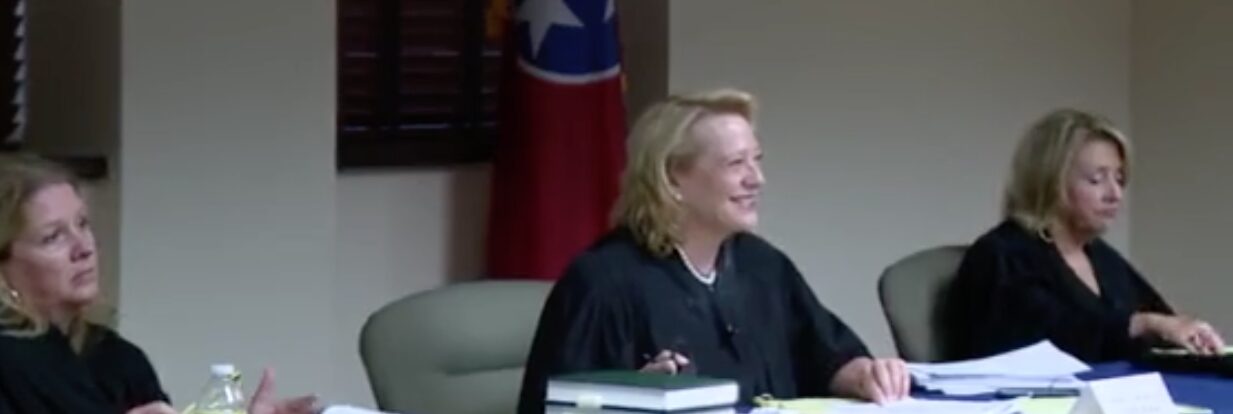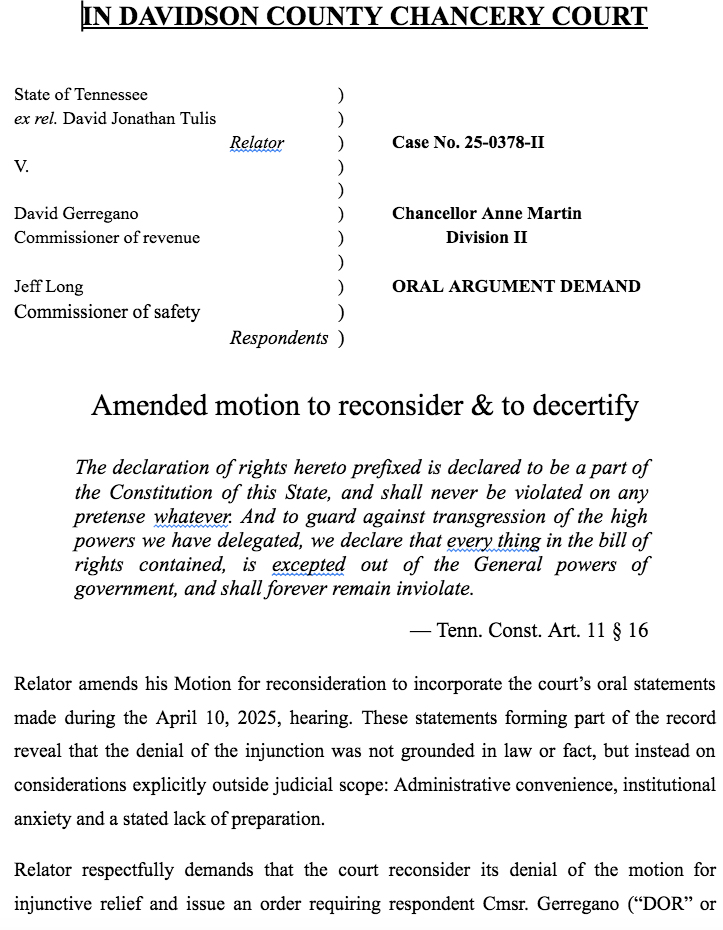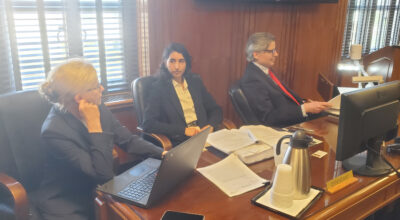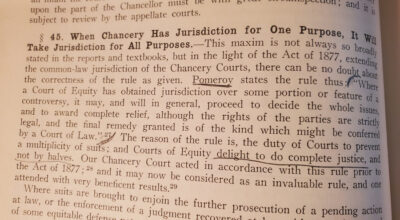
The errant department of safety is run out of the Snodgrass tower in Nashville, the “system” Judge Martin fears to upset by denying demand for injunction in the state “Eye of Sauron” case. (Photo Google Earth)

Anne Martin, center, presiding over the State ex rel. David Tulis v. Jeff Long et al case to end a state-based fraud, takes part in proceedings in another matter. (Photo Anne Martin)
CHATTANOOGA,Tenn., Friday,April 25, 2025 — Arriving today by U.S. mail in the chancery court in Nashville is a demand for reconsideration of my motion for injunction against “Eye of Sauron“ run by department of revenue in a generally accepted and AG-defended extortion program serving the insurance industry.
The motion sharply brings to the court’s attention the basis upon which chancellor Anne Martin was to have evaluated the filings and the oral arguments April 10.
EIVS no longer adheres to its legal constraints. It is being applied not to monitor certified motor vehicle liability policies — as specifically defined at T.C.A. § 55-12-102(7) — but broadly to monitor uninsured or “noncustomer” vehicle registrants in a manner untethered to SR-22 certificates or the statutory requirements for maintaining proof of financial responsibility. This deviation violates both the letter and spirit of the financial responsibility law certification requirement.
Quoting the court:
The relief that you request is broad and sweeping and involves a serious determination regarding whether these departments are operating properly whether they are operating within the statutes. *** But I have such a limited record and you’re asking for such sweeping relief at this phase of the case. I don’t know how I can get there. So help me understand how a court at this point with this limited record could find that you’re entitled to this extraordinary relief not only to impact your case personally, but also to impact the implementation of the whole system.
(Approx. 43:5) (emphasis added)
So, I’m trying to figure out – these issues you’re talking about are big issues, the complex issues. They involve two different large agencies at the state and so forth. It is difficult for me to imagine how I can get there at a preliminary or temporary injunction stage with such limited information. And I don’t see where doing so is going to prevent some sort of significant injury that’s going to occur prior to the outcome of the case where the court has more information to make a more informed decision.
(Approx. 51:40) (emphasis added)
The Court finds that the plaintiff has not met his burden at the temporary injunction stage to show a likelihood of success on the merits. There are many legal issues in question. ***The court is not convinced on the legal claims that the plaintiff has brought to support the grant of extraordinary relief that is being sought in this case, extraordinary relief because it’s injunctive. But also it is broad. It is sweeping. It is significant. It will have a major impact on some significant programs administered by the state. And the court is just not convinced that the plaintiff will succeed on his claims.
(Approx. 1:59:00) (emphasis added)
These statements do not reference legal standards or statutory construction. They reflect an improper concern with administrative consequence and institutional disruption — matters outside the scope of judicial analysis in a case involving statutory interpretation and equity relief.

I amend a motion to reconsider to bring in some of her quotes from the April 10 hearing.
How can the court not be convinced the plaintiff will succeed on the claims when the court admits it does not understand the law sufficiently? To protect the property and rights infringed by a reading of the applicable law presented in the complaint and memorandum of law supporting injunction, a temporary restraining order would immediately provide relief to those infringements to the specific harms claimed while the court works through the questions it ostensibly has.
Be the first of your friends to hear fiery David argue
This case is about law, not policy. This court is not to be swayed by how “broad” or “sweeping” the legal consequence may be. If the law requires decertification of EIVS, or demonstrates that it was unlawfully certified, it appears not within the court’s discretion to defer enforcement of the law upon respondents due to discomfort about the magnitude of state agency malfeasance or the complexity of the relief.
Over 20 months of relator litigation to halt the program, respondents report having obtained 68,053 criminal convictions for “no insurance” or “no proof of financial responsibility,” (“POFR”) they tell the legislature. Such record of harm should shock the court’s conscience.
These convictions under color of T.C.A. § 55-12-139 are against people like relator — poor folk. The impact of abusive administration of EIVS unlawfully infringe upon vested rights and property because respondent DOR isn’t adhering to the law enacted by the legislature, creating wrongful enforcement of an otherwise beneficial act. Innocent relator faces just such criminal prosecution as near certain irreparable harm involving innocent use of family automobiles.
Amended motion to reconsider & to decertify

I am reporter with Eagle Radio Network — marvelously playing rock hits in Chattanooga, and online at https://www.eagleradionetwork.com/
David runs a personal nonprofit fighting and mercy ministry. He thanks you for checks sent directly to c/o 10520 Brickhill Lane, Soddy-Daisy, TN 37379. Also at GiveSendGo.

